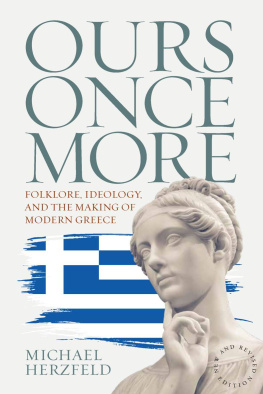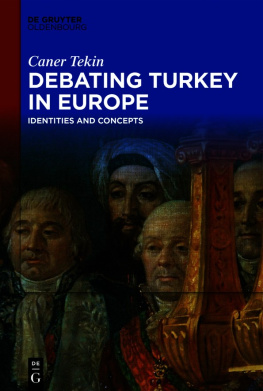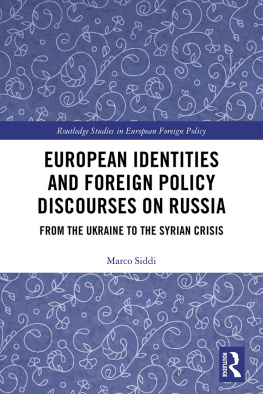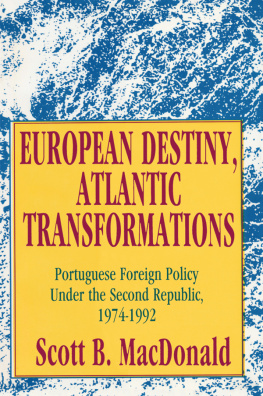Inside European Identities
BERG
Ethnic Identities
SERIES
General Editors:
Shirley Ardener, Director, Centre fo r Cross-Cultural Research on Women, University of Ox fo rd
Tamara Dragadze, School of Slavonic and East European Studies, University of London
Jonathan Webber, Institute of Social and Cultural Anthropology, University of Oxford
Inside European Identities
Ethnography in Western Europe
EDITED BY
SharonMacdonald
First published 1993 by Berg Publishers
Published 2020 by Routledge
2 Park Square, Milton Park, Abingdon, Oxon OX14 4RN
605 Third Avenue, New York, NY 10017
Routledge is an imprint of the Taylor & Francis Group, an informa business
Sharon Macdonald 1993
All rights reserved. No part of this book may be reprinted or reproduced or utilised in any form or by any electronic, mechanical, or other means, now known or hereafter invented, including photocopying and recording, or in any information storage or retrieval system, without permission in writing from the publishers.
Notice:
Product or corporate names may be trademarks or registered trademarks, and are used only for identification and explanation without intent to infringe.
Library of Congress Cataloging-in-Publication Data
Inside European Identities: ethnography in Western Europe/
edited by Sharon Macdonald.
p. cm. (Ethnicity and identity)
Includes bibliographical references and index.
ISBN 0854967230
0854968881
1. EuropeEthnic relations. 2 MinoritiesEurope.
I. Macdonald. Sharon. II. Series.
D1056.I49 1993
305.8'0094dc20 9214740
CIP
British Library Cataloguing in Publication Data
A CIP catalogue record for this book is available from the British Library.
ISBN 13: 978-0-85496-888-6 (pbk)
ISBN 13: 978-0-854-96723-0 (hbk)
Contents
Sharon Macdonald
Sharon Macdonald
Cris Shore
Ronald Frankenberg
Jeremy MacClancy
Oonagh O'Brien
Rosemary McK echnie
Rosanne Cecil
Fiona Bowie
Malcolm Chapman
Maryon McDonald
Guide
This volume brings together some recent ethnographic studies of West European cultures. Although these studies pre-date the single European Market and the recent dramatic social and political upheavals in Eastern Europe, these events demonstrate vividly that it is vital that we understand the nature of people's allegiance to their nation, state, locality and ethnicity. As the face of Europe is being redrawn, we need, perhaps more crucially than ever, to be able to get inside the identities of its peoples.
The original reasons for deciding to collate a volume on West European identities were less momentous, though the motives always included an awareness that the subject was of direct social importance as well as being of ethnographic interest. In January 1988 a workshop entitled 'Ethnographic Approaches to Ethnicity' was organised by myself and Tamara Kohn with the assistance of Shirley Ardener at the Pauling Centre for Human Sciences in Oxford, and the chapters here are largely based on presentations made at that workshop. The workshop was inspired in part by the 'History and Ethnicity' seminar runby the late Edwin Ardener. Financial support for the workshop came from the Institute of Social Anthropology, Oxford, and I thank, on behalf of myself and the others involved in the workshop, the Institute, and particularly Dr Wendy James, for the assistance. In the event we were inundated with offers of fascinating papers on many dimensions of ethnicity from many parts of the world. In the face of what were simply too many papers to be accommodated in one easily manageable event we decided to focus on Western Europe on that particular occasion, and follow up the widespread interest which had been revealed in a series of weekly seminars on various aspects of identity. These seminars are organised by Jonathan Webber, Tamara Dragadze and Shirley Ardener, and are held at the Institute of Social Anthropology, Oxford. The first theme of these seminars was East European identities. Following up this theme a complementary volume to the present one will be published in this new Berg series on ethnicity and identity.
I would like to thank all of those who participated in the 'Ethnographic Approaches to Ethnicity' workshop, and particularly Tamara Kohn for her enthusiasm and support for the original project. Shirley Ardener, who was also involved in the workshop, has been a constant and invaluable source of wisdom and help both with regard to this proj ect and to me personally over many years now. I extend special thanks to all of the cont ributors to this volume, and to Dr Marion Berghahn, Alison Duncan, Margaret Hardwidge and Nigel Hope of Berg Publishers, for their work and for putting up with my various requests and changes of address.
SHARON MACDONALD
Keele University
Identity Complexes in Western Europe: Social Anthropological Perspectives
SharonMacdonald
Today, as many of the old political barriers between Western and Eastern Europe are collapsing, and as increased economic and political union within the European community becomes a fact of life, the question of what 'Europe' means and could come to mean to its diverse peoples takes on even greater significance. The events of the 1990s would seem to have the potential for radically reshaping people's identities. But will they? Any attempt even to begin to answer questions such as this must address the multiple issues raised by the national, ethnic, regional and local identities within Europe. Where do people's allegiances lie? How deep do identities run? How far does a local identification preclude a supra-local one? And how are such large-scale categories as 'Europe' or even 'Britain', 'France' or 'Spain' actually experienced in everyday life?
Questions of identity come to the fore at times of social and political change. While on the one hand it might seem that as borders become weaker as people and goods traverse them more easily there will be a consequent relaxing of the sense of allegiance to place and people, very often the reverse is actually the case. Notions of 'us' and 'them' become stronger still; immigrants are perceived as a threat. Witness the revival of aggressive and racist neo-nationalisms in many parts of Europe at this present time. Clearly, the way in which social identities are manifest needs to be understood in terms of the changing social, economic and political contexts of the many social groups within Europe's diverse countries, as well as in terms of the various social and cultural frameworks for thinking about the question 'who are we?'. Who will perceive the present and future changes as a threat, and who will perceive them as an opportunity, depends crucially on the nature of the identity which they hold.
These are all issues which require detailed study and understanding of the peoples and cultures of Europe. In this book we bring together recently completed or ongoing ethnographic research on various regions of Western Europe. This research is based on detailed studies of particular groups and peoples and involves, at least in part, long-term and first-hand study (i.e. ethnography). The theoretical arguments which we bring to bear are for the most part drawn from social anthropology, the discipline which has particularly developed the ethnographic method, and that in which the contributors to this volume were trained. A single narrowly defined theoretical perspective, which would be uncharacteristic of social anthropology, is not reflected in the contributions here. The intention of the book is not to map out a comprehensive picture of West European identities - research is still far too patchily distributed and thin on the ground even to begin to do so. Although the territory covered here is large, and there are some lacunae and imbalances arising from the contingencies of research funding, current ethnographic and individual predilections, and the specific history of this particular collection, we hope to show what can be illuminated by an ethnographic study of identity. In particular, we hope to highlight some of the issues involved in identity formation, maintenance and change 'on the ground' within Western Europe issues which are often overlooked in the recourse to rhetoric and generalisations at a time of social and political change.










